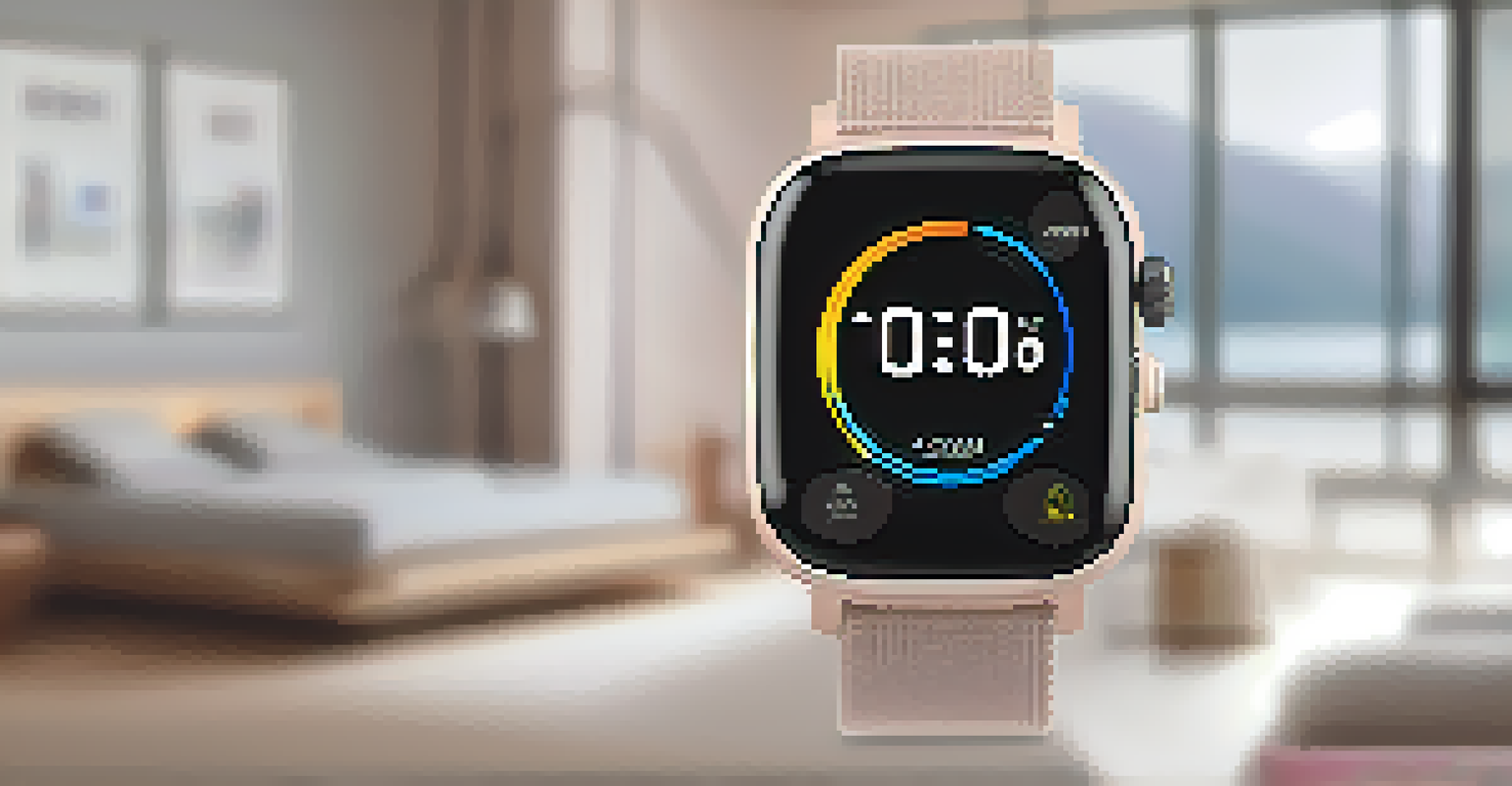Wearable Tech: Can Smart Devices Improve Your Sleep Quality?

Understanding Sleep Quality and Its Importance
Sleep quality is crucial for overall well-being, impacting mood, cognition, and physical health. A good night's sleep helps your body repair itself and plays a vital role in memory consolidation. However, many people struggle with poor sleep, often feeling fatigued or irritable during the day.
Sleep is the best meditation.
Factors such as stress, environment, and lifestyle choices can significantly affect how well we sleep. Understanding what constitutes quality sleep—like uninterrupted cycles and adequate duration—can help in identifying issues. This is where wearable tech can step in, offering insights and solutions to help improve sleep habits.
By monitoring sleep patterns, these devices can provide valuable feedback on your sleep quality. This information empowers you to make informed decisions that promote better sleep, such as adjusting bedtime routines or sleep environments.
How Wearable Tech Monitors Sleep Patterns
Wearable devices like fitness trackers and smartwatches have built-in sensors that monitor various aspects of your sleep. They track metrics such as heart rate, movement, and even blood oxygen levels to assess your sleep cycles. By analyzing this data, they can determine the amount of time spent in different sleep stages, such as light, deep, and REM sleep.

For instance, if you wake up feeling groggy, a wearable device can provide insights into how much deep sleep you actually got. This helps in understanding whether your sleep was restful or if disruptions occurred throughout the night. Knowing these details can lead to targeted changes in your sleep environment or habits.
Sleep Quality Affects Well-Being
Quality sleep is essential for mood, cognition, and physical health.
Many of these devices also integrate with smartphone apps, allowing you to visualize your sleep data over time. This combination of tracking and feedback can motivate you to prioritize sleep, making it a key part of your health and wellness routine.
The Benefits of Sleep Tracking with Wearables
One of the primary benefits of sleep tracking is awareness. Simply knowing how your sleep patterns fluctuate can encourage healthier habits. For example, if a device shows that late-night screen time is affecting your sleep, you might decide to implement a digital curfew to improve your rest.
A good laugh and a long sleep are the best cures in the doctor’s book.
Moreover, these devices often offer personalized recommendations based on your sleep data. They might suggest optimal bedtime, relaxation techniques, or even breathing exercises tailored to your needs. This personalized approach can be incredibly motivating, helping you build a healthier sleep routine.
Additionally, tracking sleep over a longer period can reveal trends that may not be obvious day-to-day. Understanding these patterns can help you identify what works best for you, leading to improved sleep quality over time.
Smart Alarm Features: Waking Up Right
Beyond tracking, many wearable devices come equipped with smart alarm features. These alarms can wake you up during a light sleep phase, making it easier to start your day feeling refreshed. Instead of feeling jolted awake from deep sleep, this method can provide a gentler transition to consciousness.
For example, if your wearable detects that you are in a light sleep stage within a specified time frame, it will trigger the alarm at the optimal moment. This not only makes waking up more pleasant but can also reduce morning grogginess. You might find yourself more alert and ready to take on the day.
Wearables Enhance Sleep Tracking
Wearable tech provides valuable insights into sleep patterns, helping users make informed adjustments to improve their rest.
Some devices even simulate natural light, gradually brightening the environment to mimic a sunrise. This kind of gentle awakening can help align your internal clock with natural day and night cycles, ultimately enhancing your overall sleep quality.
Combining Wearable Tech with Good Sleep Hygiene
While wearable tech offers valuable insights, it's important to remember that they work best when combined with good sleep hygiene practices. This means creating a sleep-friendly environment, such as keeping your bedroom dark, cool, and quiet. Establishing a consistent sleep schedule is also crucial, as it helps regulate your body's internal clock.
Incorporating relaxation techniques into your nightly routine can further enhance the benefits of sleep tracking. Activities like reading, meditating, or gentle stretching can signal to your body that it’s time to wind down. When paired with the data from your wearable, these practices can lead to significant improvements in sleep quality.
Ultimately, the goal is to create a holistic approach to sleep. By leveraging technology alongside healthy habits, you can maximize your chances of enjoying restorative sleep night after night.
Potential Limitations of Wearable Sleep Trackers
While wearable tech has many benefits, it's important to acknowledge some limitations. First, the accuracy of sleep tracking can vary by device and individual. Not all trackers can differentiate between sleep stages perfectly, leading to potential misunderstandings about sleep quality.
Additionally, some users may find themselves becoming overly reliant on the data, leading to anxiety about sleep. This phenomenon, often referred to as 'orthosomnia,' occurs when people become obsessed with achieving perfect sleep metrics. It's vital to remember that not every night will be ideal, and that's perfectly normal.
Smart Alarms Improve Mornings
Smart alarm features in wearables wake users during light sleep phases, promoting a more refreshing start to the day.
Lastly, while wearables can provide insights, they cannot replace the advice of healthcare professionals. If you're experiencing persistent sleep issues, consulting a doctor or a sleep specialist is crucial for addressing underlying problems.
The Future of Wearable Tech in Sleep Improvement
As technology continues to evolve, the future of wearable tech holds exciting possibilities for sleep improvement. Innovations like advanced sensors and AI-driven analytics could provide even deeper insights into sleep health. Imagine a device that not only tracks but also predicts sleep disruptions based on environmental factors or lifestyle changes.
Moreover, integration with other smart home devices could create a more conducive sleep environment. For instance, your wearable could communicate with your thermostat to adjust the temperature as you prepare for bedtime. This kind of interconnectedness can lead to more personalized and effective sleep solutions.

Ultimately, as wearables become more sophisticated, they will likely play an increasingly significant role in promoting better sleep habits. With the right tools and knowledge, achieving quality sleep can be more attainable for everyone.